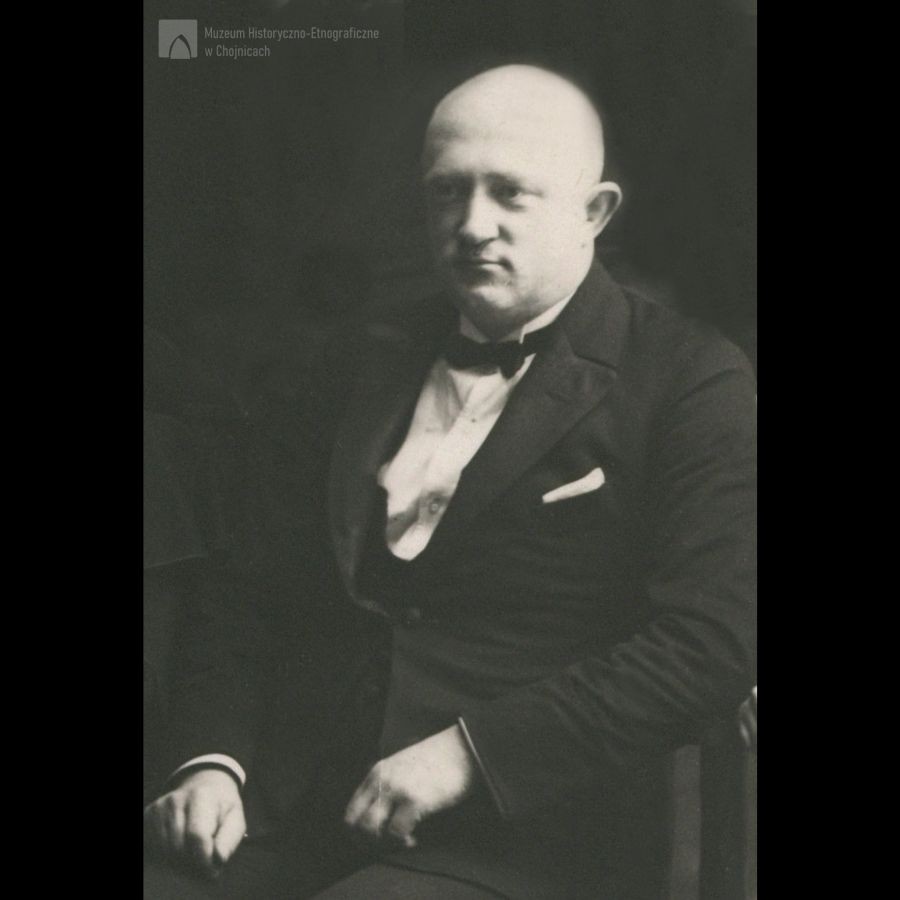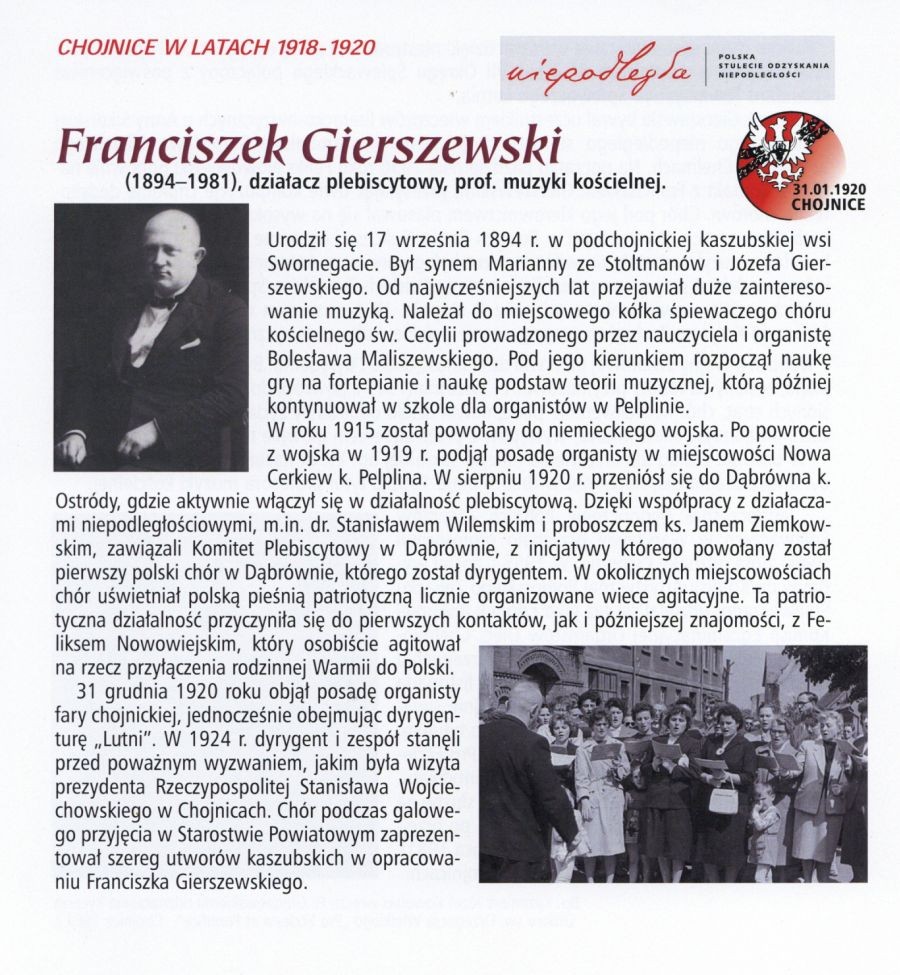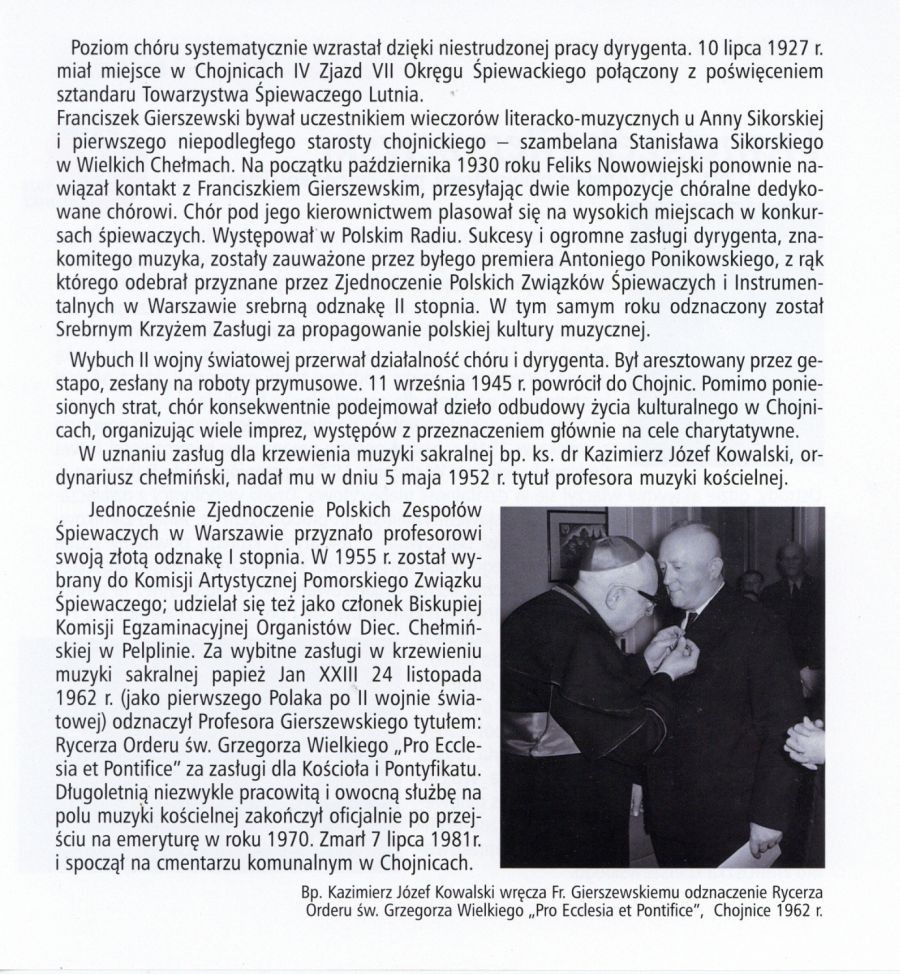
Franciszek Gierszewski (1894-1981), organist, composer, choir conductor, professor of church music, plebiscite activist
Music connects generations, expresses emotions full of joy as well as sadness. In the previous century, too, it constituted a dialogue between people. A great animator of musical life in Chojnice was undoubtedly Franciszek Gierszewski. He was born on 17 September 1894 in the Kashubian village of Swornegacie, in the Chojnice district. His father was Józef, a farmer and postman, and his mother was Marta z. d. Stoltmann. From his earliest years he showed great interest in music. He belonged to the local church choir of St. Cecilia, led by the teacher and organist Bolesław Maliszewski. Then, at the encouragement of the parish priest and builder of the new church in Swornegacie, Father Franciszek Drapiewski, he studied at the bishop's school of church music in Pelplin under the direction of the eminent organist Oskar Hermańczyk.
In 1915, he was called up into the German army. After the First World War, in 1919 he took up a post as organist in Nowa Cerkiew near Pelplin, and in 1920 he moved to Dąbrówno, near Ostróda. There he took part in the establishment of the first Polish choir, of which he became conductor. In the surrounding villages, he added splendour to the numerous agitational rallies organised with Polish patriotic songs. On behalf of the Main Plebiscite Committee in Olsztyn, Franciszek Gierszewski was in charge of the Dąbrówno district, and at the same time served as commander of the Mazurian Guard.
Gierszewski became associated with Chojnice in 1920, taking up the post of organist of the Chojnice parish church and at the same time becoming conductor of the ‘Lutnia’ choir. The Lutnia Singing Society played an important role in the repolonisation of the heavily Germanised town during the period of the breakthrough and the first years of independence. In addition to its function as a church choir, it also carried out various cultural and educational activities: it organised concerts of Polish songs, theatrical performances, evening entertainment and organised Polish language courses. It was to its musical director and conductor that the ‘Lutnia’ owed its high artistic level and numerous successes at Pomeranian singing group competitions. The effects of Gierszewski's work were rated very highly by the eminent composer Feliks Nowowiejski. In 1924 the ensemble faced a serious challenge - the visit of Stanisław Wojciechowski, President of the Republic of Poland, to Chojnice. The choir presented a number of Kashubian pieces in Gierszewski's arrangement during a gala reception organised on that occasion at the District Starosty.
The level of the choristers steadily increased thanks to the untiring work of the conductor. On 10 July 1927 the Fourth Congress of the 7th Singing District took place in Chojnice, combined with the consecration of the banner of the Singing Society.
‘Lutnia’ also established contact with the Polish community in Zlotowszczyzna. A memorable event in the history of the ensemble was its participation in a patriotic celebration in May 1930 in Zlotow. At the beginning of October 1930. Feliks Nowowiejski re-established contact with Franciszek Gierszewski, sending two choral compositions dedicated to the choir.
Franciszek Gierszewski's services were recognised by the former Prime Minister, Antoni Ponikowski, from whose hands he received the Second Degree Silver Badge (1934) awarded by the Union of Polish Singing and Instrumental Societies in Warsaw. He was also awarded the Silver Cross of Merit (1936) for promoting Polish musical culture. He was also respected in society - he used to participate in literary and musical evenings at the home of Anna and Stanisław Sikorski in Wielkie Chełmy.
The Second World War interrupted the activities of the choir and the conductor. Franciszek Gierszewski was arrested by the Gestapo and sent to forced labour. On 11 September 1945, he returned to Chojnice. On 12 January 1946, he married Gertruda Pozorska 1st v. Nowacka and settled at 15 Piłsudskiego St. The couple enjoyed spending summers at the ‘Lutnia’ villa by the lake in Charzyki - Zacisze.
Despite the losses suffered, the choir consistently undertook the work of rebuilding cultural life in Chojnice by organising many events, mainly for charitable purposes. In recognition of his contribution to the propagation of sacred music, Bishop Dr Kazimierz Józef Kowalski, Ordinary of Chełmno, awarded Franciszek Gierszewski the title of Professor of Church Music on 5 May 1952. At the same time, the Union of Polish Singing Ensembles in Warsaw awarded the professor its gold badge of first degree. In 1955, he was elected to the Artistic Commission of the Pomeranian Singing Association. In 1956, in turn, the choir won first place in a competition with 48 Pomeranian singing ensembles. During the Stalinist period, the ensemble was increasingly restricted in its activities and eliminated from cultural life outside the church. The conductor and his choristers never resigned themselves to such discrimination and often added splendour to regional festivities. Gierszewski was also active as a member of the Bishop's Examination Board for Organists of the Chelmno Diocese in Pelplin. For his outstanding contribution to the propagation of sacred music, Pope John XXIII awarded Professor Gierszewski the following title on 24 November 1962: Knight of the Order of St Gregory the Great, ‘Pro Ecclesia et Pontifice’ for services to the Church and the Pontificate.
Franciszek Gierszewski officially ended his long and hard service with his retirement in 1970. He handed over the organ and the conducting baton for the next 25 years to his pupil Franciszek Koperski. He did not say goodbye to music completely. He was also involved in the running of the parish chancellery. He died on 7 July 1981 and was buried in the municipal cemetery in Chojnice. He was undoubtedly an outstanding figure in the history of our town. His talent and musical artistry, confirmed by numerous awards and distinctions, made a lasting mark on the pages of Chojnice's history. He remained in the memory of the townspeople as a universally respected man with an engaging manner and high personal culture. On the feast of the patron saint of church music, St Cecilia, on 21 November 1981, on the initiative of the Kashubian-Pomeranian Association a commemorative plaque was unveiled in the Basilica of St John the Baptist, to commemorate Professor Franciszek Gierszewski, who had served as organist in the church for almost half a century.
More information about Franciszek Gierszewski can be obtained from the following publications: ‘Pamięci godni. Chojnicki słownik biograficzny 1275 - 1980’ by Zbigniew Stromski from 1986, ’Poczet zasłużonych Chojniczan. Biographical dictionary of the 20th century.’ Kazimierz Ostrowski, 2020.

